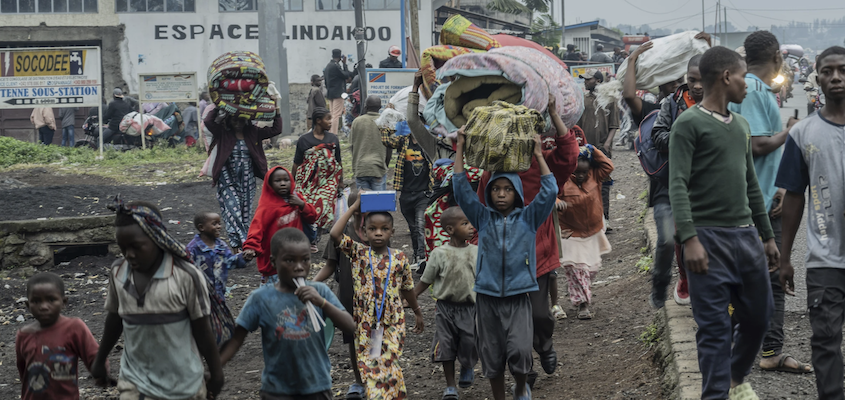Why Hasn’t the UNSC Sanctioned Rwanda or Referred Its President to the ICC?
TRANSCEND MEMBERS, 3 Feb 2025
Ann Garrison | Black Agenda Report – TRANSCEND Media Service

People displaced by the fighting with Rwandan forces make their way to the center of Goma, Democratic Republic of the Congo, Sunday, 26 Jan 2025. Photo: Moses Sawasawa/AP
29 Jan 2025 – The UN Security Council (UNSC) has never sanctioned Rwanda or referred its president to the International Criminal Court (ICC), despite decades of UN documentation of their international crimes in the Democratic Republic of the Congo (DRC).
On December 27, Rwanda’s M23 militia claimed to have seized Goma, the capital of Congo’s North Kivu Province and a city of three million people. Some sources reported, however, that Congolese forces were still fighting.
On January 28, Al Jazeera reported that protestors in Kinshasa, the capital of the Democratic Republic of the Congo (DRC), had attacked the embassies of France, Belgium, Rwanda, Uganda, Kenya, and the US, accusing them all of responsibility for Rwanda’s war in DRC’s eastern North and South Kivu Provinces.
Rwandan forces had killed 13 UN peacekeepers from South Africa, Malawi, and Uruguay and the military governor of North Kivu Province, Major General Peter Cirimwami .
Electricity in Goma was out, children were out of school, and there were bodies in the streets. Hundreds of thousands of Congolese people were fleeing Rwandan troops and M23.
Rwanda had cut off electricity and water supplies and used advanced weaponry to interfere with GPS required for humanitarian operations.
Three days earlier, on January 25, the UN Security Council met about the crisis for three and a half hours. In addition to Council members, Congolese and Rwandan representatives were invited to speak, as were those of Angola, Burundi, South Africa, and Uruguay and the heads of UN peacekeeping, and relief operations in DRC.
All voiced support for the sovereignty and territorial integrity of DRC. Most all called on Rwanda to withdraw its forces from DRC and stop supporting M23, but only a few, including South Africa and DRC, explicitly proposed imposing UN sanctions on Rwanda.
In an eloquent statement, Congolese Minister of Foreign Affairs Thérèse Kayikwamba Wagner said:
“What the DRC is going through is not a conflict like others. It is a deliberate and methodical aggression against a sovereign state, a flagrant violation of the founding principles of this organization and an intolerable attack against international peace and security.
“The Democratic Republic of the Congo legitimately expects from this council to act firmly and promptly to safeguard international peace and security and to uphold international law. This is a power that is exclusively granted to the Council by the UN Charter.”
She said that the Council could not keep limiting its responses to “declarations of concern” and “remain seized of the matter.” Instead she called on it to:
- Order the end of hostilities by Rwanda and demand the immediate withdrawal of Rwandan troops on Congolese soil;
- impose targeted sanctions, including asset freezes and travel bans, not only against members of the Rwandan chain of command, but also against the political decisionmakers responsible for the aggression;
- embargo all mineral exports labeled as Rwandan, especially coltan and gold, in order to end the illicit exploitation of DRC’s mineral wealth at the heart of the conflict;
- revoke Rwanda’s status as a troop contributor to UN peacekeeping operations; and
- establish a systematic regime of violation of all transfer or sale of weapons to Rwanda by member states or private entities.
One more measure that the Council is empowered to take is referral of Rwanda’s leaders to the International Criminal Court for investigation and potential indictment for their well-documented international crimes. Some ambassadors and officials identified the attacks on UN peacekeepers as war crimes, and previous UN reports have identified Rwanda’s crimes against humanity. The 2010 UN Mapping Report even documented crimes that it said could be judged as genocide if brought to a competent court.
The ICC indicted Libya’s Muammar Gaddafi, Sudan’s Omar al-Bashir, Ivory Coast’s Laurent Gbagbo, and Russia’s Vladimir Putin, but despite decades of abundance of his crimes, it has never indicted Rwandan President Paul Kagame or any of his top officials and commanders. This demonstrates, of course, that Western leaders use the ICC to pursue their political agendas, not to impose international criminal justice.
The UN Security Council has never taken the measures proposed by DRC’s Foreign Minister nor the referral of Paul Kagame to the ICC and most likely never will. Why? No doubt because the illegal minerals traffic is enriching powerful Western states, corporations, and individuals who ultimately prefer the status quo, no matter how much suffering it causes the Congolese people.
Another equally sinister reason may lie in the roots of the Rwandan Genocide, the 1994 tragedy that Kagame and his Rwandan Patriotic Front party have used as an excuse to justify their tyrannical rule in Rwanda, their ethnic Tutsi dominance, and their crimes in DRC ever since.
If Kagame were ever brought before the ICC, he might well start talking about Bill Clinton and other members of the US State Department, military, and national security apparatus involved in covert support for his Rwandan Patriotic Army’s aggression in Rwanda during the 1990 to 1994 Rwandan Civil War, which ended in the infamous 90-day bloodbath.
In 2009 , at an International Peace Institute event, Kagame said, “Genocide in Rwanda — the causes of it are not Rwandan, are not African.” The genocide, he said, “has its roots somewhere else.”
He went on to criticize the International Criminal Court as unfairly targeting Africans. Indeed, prior to its indictment of Vladimir Putin, the ICC had earned its reputation as the International Caucasian Court for prosecuting Africans. However, without naming individuals or countries, Kagame seemed to be warning that, should he one day find himself on trial in the Hague, he would start naming names and countries outside Rwanda’s borders who organized and benefited from the 1994 bloodbath and its aftermath in DRC.
_______________________________________________
 Ann Garrison is an independent journalist based in the San Francisco Bay Area. She attended Stanford University and is a member of the TRANSCEND Network for Peace Development Environment. In 2014 she received the Victoire Ingabire Umuhoza Democracy and Peace Prize for her reporting on conflict in the African Great Lakes region. She can be reached at ann@anngarrison.com
Ann Garrison is an independent journalist based in the San Francisco Bay Area. She attended Stanford University and is a member of the TRANSCEND Network for Peace Development Environment. In 2014 she received the Victoire Ingabire Umuhoza Democracy and Peace Prize for her reporting on conflict in the African Great Lakes region. She can be reached at ann@anngarrison.com
Go to Original – blackagendareport.com
Tags: Africa, Conflict Analysis, D.R. Congo, Rwanda, Violent conflict, Warfare
DISCLAIMER: The statements, views and opinions expressed in pieces republished here are solely those of the authors and do not necessarily represent those of TMS. In accordance with title 17 U.S.C. section 107, this material is distributed without profit to those who have expressed a prior interest in receiving the included information for research and educational purposes. TMS has no affiliation whatsoever with the originator of this article nor is TMS endorsed or sponsored by the originator. “GO TO ORIGINAL” links are provided as a convenience to our readers and allow for verification of authenticity. However, as originating pages are often updated by their originating host sites, the versions posted may not match the versions our readers view when clicking the “GO TO ORIGINAL” links. This site contains copyrighted material the use of which has not always been specifically authorized by the copyright owner. We are making such material available in our efforts to advance understanding of environmental, political, human rights, economic, democracy, scientific, and social justice issues, etc. We believe this constitutes a ‘fair use’ of any such copyrighted material as provided for in section 107 of the US Copyright Law. In accordance with Title 17 U.S.C. Section 107, the material on this site is distributed without profit to those who have expressed a prior interest in receiving the included information for research and educational purposes. For more information go to: http://www.law.cornell.edu/uscode/17/107.shtml. If you wish to use copyrighted material from this site for purposes of your own that go beyond ‘fair use’, you must obtain permission from the copyright owner.
Join the discussion!
We welcome debate and dissent, but personal — ad hominem — attacks (on authors, other users or any individual), abuse and defamatory language will not be tolerated. Nor will we tolerate attempts to deliberately disrupt discussions. We aim to maintain an inviting space to focus on intelligent interactions and debates.